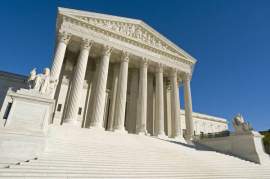
Fred M. Vinson

Popular In Constitution
Purpose Of Lifetime Appointment And Pros And Cons Enumerated Powers Bicameral Legislature Background Article 3 Of The Constitution We The People 1st Amendment Who Wrote The Constitution Judicial Review Equal Protection Clause 5th Amendment 10th Amendment Three Fifths Compromise
During the life of Fred M. Vinson, he served a role in all three branches of the United States Government and was the most prestigious among his political family. An additional six members to the Vinson family held prominent roles in legislation. As a participant to the legislative branch, Vinson was elected a member of the U.S. House of Representatives which he ran for a term of twelve years. He assumed the role as Secretary of Treasury from 1945-1946, before moving on to the judicial branch where he served as Chief Justice starting in 1946.
Sworn in under oath as the Chief of Justice, Vinson was said to come into office during a time where the personal and intelligent facets of the Supreme Court were compromised. During Vinson's time he wrote 13 dissenting opinions for the court and 77 opinions on the condition of the Supreme Court overall. His strongest disapproval was when the Court voided President Truman from seizing a steel industry during a strike in 1952.
Fred Vinson was also known for his ruling of the Hollywood Ten. Under his leadership, the Court refused to hear the appeal of the Hollywood Ten in their 1947 Congress charge. The Hollywood Ten was a group of directors and writers charged with contempt for refusing to answer questions posed by Congress. The 10 members that made up the Hollywood Ten refused to answer questions regarding their involvement with Communism. Each member of the Hollywood Ten was sentenced to 1 year of prison time and were among a group who was later blacklisted, and thus, prohibited by the Court to reenter the movie industry.
The Fred Vinson Court also handled issues regarding racial segregation. Regarding the issue of segregation, Fred Vinson ruled that states in the South who participated in the "separate but equal practice" needed to set up facilities that were really separate but equal. Fred Vinson's Court also handled rulings regarding labor unions, Communism, and loyalty oaths.
Fred Vinson was the last Chief Justice to be appointed by the Democratic Party. During his time in office he wrote several opinions to better the business practices of the Supreme Court, which, at the time, was flawed. Fred Vinson was a very intellectual man who pushed for better American practices. He believed that war was created by man and how man built the structures of his environment. Fred Vinson's belief was that anything created by man was changeable.
Vinson held strong political views from his earlier days spent as Governor of Kentucky. His additional positions serving as a U.S. Court of Appeals Judge and Secretary of Treasury geared him for his role as Chief Justice.
The most infamous ruling of Fred Vinson was the refusal of his Court to listen to the appeals of the Hollywood Ten party for exercising the first amendment. Fred Vinson is also associated with setting up laws to better govern the practices of labor unions and setting up actual separate but equal facilities in the South.


















